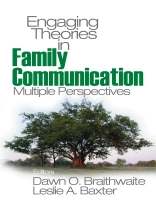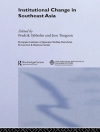‘The breadth of theories presented and collected in this text is an impressive accomplishment. The editors have done a great service to the field with this book.’ —Lynn H. Turner, Marquette University
‘The chapters are very informative, useful, and accessible. There is a huge need to better ground family communication in theory, and this text will provide an important start for students and researchers.’ —Douglas Kelley, Arizona State University
To date, scholars from disciplines other than communication have dominated the study of family communication. Engaging Theories in Family Communication: Multiple Perspectives covers uncharted territory in its field, as it is the first book on the market to deal exclusively with family communication theory. In this volume, editors Dawn O. Braithwaite and Leslie A. Baxter bring together a group of contributors who represent a Who′s Who in the family communication field. These scholars examine both classic and cutting-edge theories to guide family communication research in the coming years.
Key Features:
- A clear overview of theory and three meta-theoretical discourses— logical empirical, interpretive, and critical—to provide readers with a current landscape of family communication research
- Chapter-opening notes help students understand the paradigm into which a theory falls and the historical roots of each theory
- Foreword by renowned scholar Anita Vangelisti frames the current state of family communication and provides a unique perspective on theory-building in family communication
Engaging Theories in Family Communication is designed for students studying family communication in courses such as Family Communication, Personal Relationships, Communication Theory, Applied Communication, and Advanced Interpersonal Communication. It can also be used in a variety of Family Studies, Sociology, and Psychology courses focusing on family communication.
Inhoudsopgave
Preface – Dawn O. Braithwaite and Leslie A. Baxter
Foreword: Family Communication Theories: Variations and Challenges – Anita L. Vangelisti
1. Introduction: Meta-Theory and Theory in Family Communication Research – Leslie A. Baxter and Dawn O. Braithwaite
I. Theories Originating in Communication
2. Communication Accommodation Theory: An Intergroup Approach to Family Relationships – Jake Harwood, Jordan Soliz & Mei-Chen Lin
3. Communication Privacy Management Theory: Understanding Families – Sandra Petronio & John Caughlin
4. Family Communication Patterns Theory: A Social Cognitive Approach – Ascan F. Koerner & Mary Anne Fitzpatrick
5. Goals-Plan-Action Theories: Theories of Goals, Plans, and Planning Processes in Families – Steven R. Wilson & Wendy M. Morgan
6. Inconsistent Nurturing as Control Theory: A New Theory in Family Communication – Beth A. Le Poire & Rene M. Dailey
7. Narrative Performance Theory: Telling Stories, Doing Family – Kristin M. Langellier & Eric E. Peterson
8. Relational Communication Theory: An Interactional Family Theory – L. Edna Rogers
9. Relational Dialectics Theory: Multivocal Dialogues of Family Communication – Leslie A. Baxter
10. Symbolic Conergence Theory: Communication, Dramatizing Messages, and Rhetorical Visions in Families – Dawn O. Braithwaite, Paul Schrodt & Jody Koenig Kellas
II. Theories Originating in Complementary Fields
11. Attachment Theory: The Reciprocal Relationship Between Family Communication and Attachment Patterns – April R. Trees
12. Attribution Theories: Assessing Causal and Responsibility Judgments in Families – Valerie L. Manusov
13. Critical Feminist Theories: A Provocative Perspective on Families – Julia T. Wood
14. Emotion Regulation Theory: A Lens for Viewing Family Conflict and Violence – William R. Cupach & Loreen N. Olson
15. Social Theories: Social Constructionism and Symbolic Interactionism – Wendy Leeds-Hurwitz
16. Social Exchange Theories: Interdependence and Equity – Marianne Dainton & Eliane D. Zelley
17. Social Learning Theory: Modeling and Communication in the Family Context – Adrianne Kunkel, Mary Lee Hummert & Michael Robert Dennis
18. Stress and Adaptation Theories: Families Across the Lifespan – Tamara Afifi & Jon Nussbaum
19. Structuration Theory: Promising Directions for Family Communication Research – Kathleen Krone, Paul Schrodt & Erika Kirby
20. Systems Theory: Patterns and (W)holes in Family Communication – Kathleen Galvin, Fran Dickson, and Sherilyn R. Marrow
21. The Theory of Natural Selection: An Evolutionary Approach to Family Communication – Kory Floyd & Mark T. Haynes
Index
About the Editors
About the Contributors
Over de auteur
Leslie A. Baxter is F. Wendell Miller Distinguished Professor of Communication Studies at the University of Iowa, where she has taught for 15 years. She has published over 130 books, book chapters, and articles on interpersonal and family communication. She is the recipient of many awards, including, from the National Communication Association, the Distinguished Scholar Award, the Bernard Brommel Family Communication Award, the Charles Woolbert Research Award, the Franklin Knower Article Award, and the Gerald Miller Book Award; the Berscheid-Hatfield Award from the International Association for Relationship Research (formerly INPR); and the inaugural WSCA Scholar Award from the Western States Communication Association.












